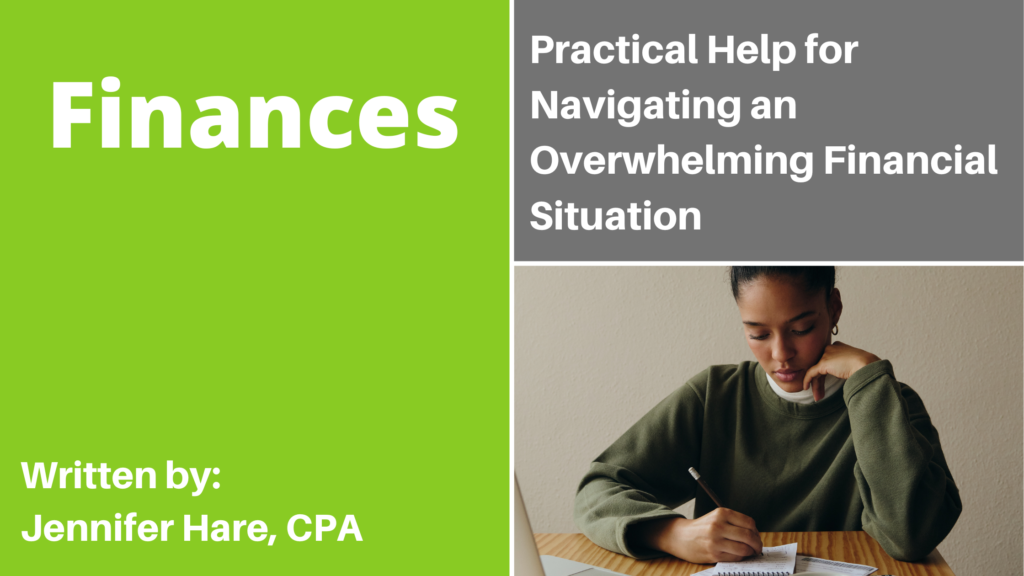Happy New Year! January is often a time where we become filled with the desire to make big changes. Too often we have the best of intentions to make these positive changes only to find ourselves overwhelmed and discouraged a few weeks into the new year. Whether you had intentions of being more prepared for unexpected expenses, dealing with debt, or simply trying to make ends meet, financial stress can take a toll on your well-being. In this article, we’ll explore practical strategies to help you navigate overwhelm and regain control of your big financial changes for 2024.
Understanding the Causes of Overwhelm:
Overwhelm is not usually caused by just one thing. Often overwhelm comes as a result of a bunch of life events occurring all at once. You may find yourself with work pressure, health challenges, personal relationship breakdowns and financial stress. Any one of these factors can cause us to be uncomfortable and having more than one at a single time can feel unbearable.
Financial overwhelm can often stem from a combination of factors, including unexpected expenses, increasing costs, mounting debts, and a lack of financial literacy. Taking the time to identify what factor(s) are causing you stress is really important. Being able to pin-point the root cause or causes of your financial stress can truly help you to combat the overwhelm.

Assess Your Financial Situation:
Start by taking a comprehensive look at your financial situation. Create a detailed list of your income, expenses, and outstanding debts. This snapshot will serve as the foundation for developing a realistic plan and identifying areas for improvement. Once you have assessed your financial situation, focus on one area to improve. I often find that people are trying to do everything at once. Tackling one financial stressor at a time, can actually help you eliminate the stressors more quickly as your efforts are being focused rather than spread out. For example, if you need to eliminate consumer debt, working on one debt at a time can often be more beneficial than trying to pay off multiple debts at the same time.
Taking the next Step to reduce Financial overwhelm:
Here are some suggestions on the first step to tackling some of the financial stressors noted above.
Financial Stressor – Unexpected Expenses
Build an Emergency Fund:
Building an emergency fund acts as a financial safety net during challenging times. Aim to save at least three to six months’ worth of living expenses but know that any amount in savings can make a huge difference. Having this safety net can provide peace of mind and mitigate the impact of unexpected financial setbacks. Try setting aside a small amount each Friday. Taking $20 a week can get you to $1,000 in just a year’s time.
Financial Stressor – Increasing Costs
Prioritize Expenses:
Not all expenses are created equal. Differentiate between essential and non-essential expenses. Prioritize necessities like housing, utilities, and groceries. By focusing on the essentials, you can allocate your resources more effectively and ensure that critical needs are met. Note that your priorities may be different than someone else’s. it is important for you to look at your individual needs when assessing the essential and non-essential expenses.
Create a Realistic Spending plan:
Developing a spending plan is a key step in managing finances. Establish realistic spending limits for each category, taking into account both fixed (contracts you have) and variable (not the same each time) expenses. Be sure to leave room for savings and unexpected costs to prevent future financial strain.

Financial Stressor – Mounting debt
Create a debt repayment plan:
Similar to creating a spending plan, it is important to create a debt repayment plan. Repaying debt on a consistent and frequent basis is often better than putting a large amount of money on the debt here and there.
Communicate with Creditors:
If you’re struggling to meet debt obligations, don’t hesitate to communicate with your creditors. Many financial institutions are willing to work with individuals facing difficulties. Negotiate revised payment plans or explore debt consolidation options to ease the burden.
Financial Stressor – Lack of Financial Literacy
Seek Professional Advice:
Financial advisors and counselors can provide valuable insights tailored to your specific situation. Whether you’re looking to invest, reduce debt, or plan for the future, seeking professional advice can help you make informed decisions and regain control. It is also important to work with a professional that you can understand and trust.
Self Education:
Improving financial literacy is empowering. Educate yourself about budgeting, investing, and managing credit. Numerous online resources, workshops, and courses are available to enhance your financial knowledge and confidence.
Managing financial overwhelm also goes beyond financial strategies. Take care of your mental and emotional well-being by incorporating self-care practices into your routine. Exercise and adequate sleep can contribute to a healthier mindset when facing financial challenges.
Financial overwhelm is a common experience, but it’s essential to recognize that there are practical steps you can take to regain control. By assessing your situation, prioritizing expenses, and seeking professional advice, you can navigate challenging financial times with resilience and confidence. Remember, building financial stability is a gradual process, and every positive step you take contributes to a brighter financial future.
Written by: Jennifer Hare, CPA
If this article has motivated you and you want more information on how to create a plan to increase your emergency savings account, please feel free to reach out to Jennifer. https://linktr.ee/financecoachjennifer




